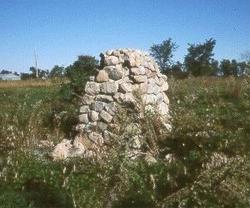During the Sioux uprising in Minnesota, a Chaska was Little Crow's Lieutenant. As the Sioux force swept the area, Chaska rescued a Minnesota trader named George Spencer, from certain death and had risked his own life in the process. When the wounded Spencer was being transferred by some women to Chaska's home, a roving band cut them off. This raiding party was told Spencer was under the protection of Chaska and Spencer survived unharmed.
Spencer came to Chaska's rescue after he was arrested and about to be hanged by telling the harrowing tale about how Chaska had saved Spencer's life and Chaska was released.
This Chaska was a scout for Sibley during the chase through North Dakota for those who had escaped the Minnesota capture. During a hunt two white scouts encountered a small Sioux band and one scout was killed. Chaska saw the conflict and helped the remaining scout hide in the tall grass, thus saving his life.
Sibley's militia was heading back to Minnesota after failing to meet with Sully along the Missouri River. It was hot, dry, the terrain was hilly and stony making travel difficult. At camp Chaska went to see the hospital steward for some liniment to relieve his back pain. The steward and Chaska shared a small quantity of alcohol and Chaska returned to his tent. About 10:00 PM an officer was notified that Chaska was having "a fit". The officer ran to Chaska's tent and found that he was having a seizure. The officer rushed to the hospital tent and found the steward in a similar though less severe situation. He prepared a tonic which helped and healed the steward, but by the time he returned to Chaska's tent it was too late. Chaska was dead.
An investigation of the alcohol bottle determined it once stored strychnine and was not properly washed out before the alcohol was transferred into it. Conspiracies abound that Chaska's death was the result of foul play, but more than likely it was the result of carelessness.
Chaska was buried at the camp site and a stone monument was erected and probably does not mark the actual spot of his burial. This state historic site is neglected. Tall weeds surround a crumbling monument which once held a memorial plaque that has been long since stolen. Chaska's isolated grave is north of Dirscoll, North Dakota.
During the Sioux uprising in Minnesota, a Chaska was Little Crow's Lieutenant. As the Sioux force swept the area, Chaska rescued a Minnesota trader named George Spencer, from certain death and had risked his own life in the process. When the wounded Spencer was being transferred by some women to Chaska's home, a roving band cut them off. This raiding party was told Spencer was under the protection of Chaska and Spencer survived unharmed.
Spencer came to Chaska's rescue after he was arrested and about to be hanged by telling the harrowing tale about how Chaska had saved Spencer's life and Chaska was released.
This Chaska was a scout for Sibley during the chase through North Dakota for those who had escaped the Minnesota capture. During a hunt two white scouts encountered a small Sioux band and one scout was killed. Chaska saw the conflict and helped the remaining scout hide in the tall grass, thus saving his life.
Sibley's militia was heading back to Minnesota after failing to meet with Sully along the Missouri River. It was hot, dry, the terrain was hilly and stony making travel difficult. At camp Chaska went to see the hospital steward for some liniment to relieve his back pain. The steward and Chaska shared a small quantity of alcohol and Chaska returned to his tent. About 10:00 PM an officer was notified that Chaska was having "a fit". The officer ran to Chaska's tent and found that he was having a seizure. The officer rushed to the hospital tent and found the steward in a similar though less severe situation. He prepared a tonic which helped and healed the steward, but by the time he returned to Chaska's tent it was too late. Chaska was dead.
An investigation of the alcohol bottle determined it once stored strychnine and was not properly washed out before the alcohol was transferred into it. Conspiracies abound that Chaska's death was the result of foul play, but more than likely it was the result of carelessness.
Chaska was buried at the camp site and a stone monument was erected and probably does not mark the actual spot of his burial. This state historic site is neglected. Tall weeds surround a crumbling monument which once held a memorial plaque that has been long since stolen. Chaska's isolated grave is north of Dirscoll, North Dakota.
Family Members
Advertisement
Explore more
Sponsored by Ancestry
Advertisement



